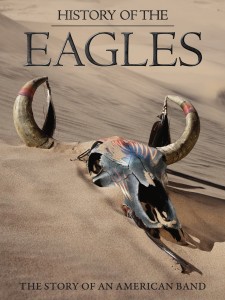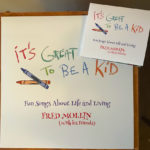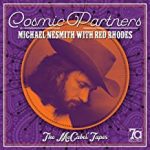 Whether or not the Eagles are your thing, their mark on American rock ‘n’ roll is undeniable. Their Greatest Hits 1971-1975 is one of the best-selling albums of all time, and here they are, forty years later still kickin’ ass. In this 3-disc collection, The History of the Eagles reminds fans why they fell in love with the band, while providing the rest with reasons why they should love the band.
Whether or not the Eagles are your thing, their mark on American rock ‘n’ roll is undeniable. Their Greatest Hits 1971-1975 is one of the best-selling albums of all time, and here they are, forty years later still kickin’ ass. In this 3-disc collection, The History of the Eagles reminds fans why they fell in love with the band, while providing the rest with reasons why they should love the band.
As the scene begins, a young Don Henley remarks, in an interview, “This is not something you could do forever. It’s not a lifetime career.” Yet that’s what ended up happening, though not for everyone. In the first two discs, Part I and Part II, behind the-scenes-moments abound with California cohorts Jackson Browne and Linda Ronstadt, and over 25 new and exclusive interviews with the current band (Henley, Glenn Frey, Joe Walsh and Timothy B. Schmit) as well as former members Bernie Leadon, Randy Meisner and Don Felder make any documentation of the Eagles here on out seem redundant. Highlights include the moments that triggered the music like that time Frey sat in a bar and noticed a young chick with an older man and said to manager Irving Azoff, “Man, look at those lying eyes,” or that time Walsh and John Belushi did $28,000 worth of hotel damage. I live in hotels, tear out the walls/I have accountants pay for it all.
Contrasting elements contribute profoundly, where it’s interesting to see clips from interviews in the 70s with the entire band present, while in more recent ones, they are interviewed individually and discuss rather touchy subjects. Frey and Felder revisit that night in April 1980 that ended the Eagles’ run, where shocking live audio of the two cursing each other out on stage surface for the first time. Other weighty conflicts arise, including lawsuits with major labels that still bear grudges to this day. Though they may have “created a monster that took a toll on all their lives,” the Eagles proved that sometimes, you’ve got to go through hell before you get to heaven.
Their 1994 reunion begins Part II, with the band shedding light on how they spent their fourteen-year separation: Henley and Frey climbing the 80’s billboard charts with their respective solo careers, Schmit’s with his work with Jimmy Buffet and Twisted Sister, and Walsh with the James Gang. Though their separate paths were justified, reuniting as the second coming of the Eagles was imperative—for one thing, it saved Walsh’s life. Impeccable cinematography and characterization pull heart strings, making the History of the Eagles not simply a documentary, but a visual memoir. A sincere Walsh discusses his sobriety, in between flashbacks of an interview from the 80’s where he swigs a beer and looks like death. Shortly after, we see him performing soberly, before the scene fades to his dressing room where a framed letter from his daughter reads: “Dad, I am so proud of you.” That was a common thread with the band after they reunited; they all had families and wanted more out of life. With a drug and alcohol-free rule implemented, the Eagles’ creative process remained pure, in turn helping them remember the natural talents that got them together originally. Yet that is just part of why the band worked so well this time around; dramatic changes within our own society provided new songwriting territory, specifically Long Road Out of Eden and its connection to 9/11 and the Iraq War. Economically, they distributed the album directly to Walmart, bypassing the music industry and allowing their fans to benefit the most. However, the definitive reason why the Eagles continue forty years later is that people still want to hear their songs. Forget burning out or fading away—the Eagles simply last.
– Melissa Caruso







Be the first to comment!